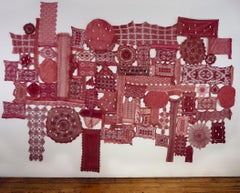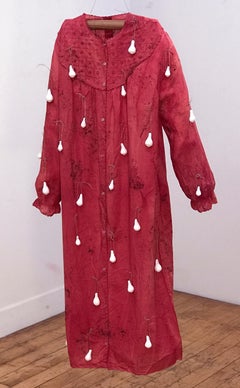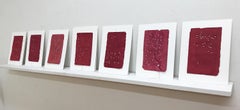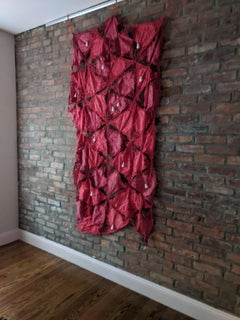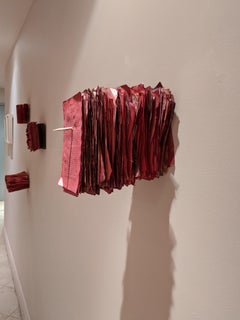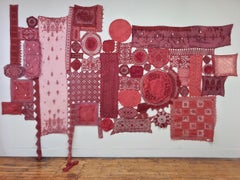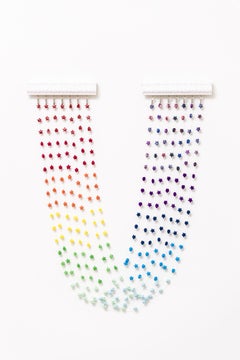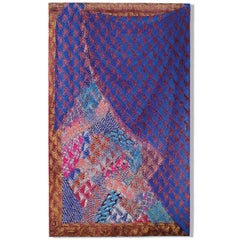Dye Sculptures
to
4
4
Overall Width
to
Overall Height
to
8
8
7
6
6
6
8
6
6
5
4
8
Medium: Dye
Artist: Patricia Miranda
Patricia Miranda, Lamentations for Ermenegilda; 2020, lace, cochineal dye, thread
Located in Darien, CT
Patricia Miranda's work includes interdisciplinary installation, textile, paper and books. The textiles incorporated in these new pieces are vintage linens from her Italian and Irish grandmothers and sourced from friends and strangers around the country. Each donation is documented and integrated into the work. Textile as a form that wraps the body from cradle to grave. The role of lacemaking in the lives of women both economically and historically is packed with metaphorical potential. The relationship of craft and women’s work (re)appropriated by artists today to environmental and social issues is integral to the artist's research.
Her work is process oriented; materials are submerged in natural dyes from oak gall wasp nests, cochineal insects, turmeric, indigo, and clay. She forages for raw materials, cook dyes, grind pigments, ecofeminist actions that consider environmental impacts of objects. The process is left visible as dyestuff is unfiltered in the vat and finished work. Sewn into larger works, Miranda incorporates hair, pearls, bone beads, Milagros, cast plaster. The distinct genetics and environmental and cultural history of each material asserts its voice as collaborator rather than medium.
The lace inserts a visceral femininity into the pristine gallery, and exerts a ghostly trace of the history of domestic labor. The combination of earth and lace references human and environmental devastation and the conflation of nature and women’s bodies as justifications for exploitation. Mournful and solastalgic, they are lamentations to the violence against women and the earth.
Patricia Miranda is an interdisciplinary artist, curator, educator, and founder of The Crit Lab, graduate-level critique seminars and Residency for artists, and MAPSpace project space. She has been Visiting Artist at Vermont Studio Center, the Heckscher Museum, and University of Utah; and been awarded residencies at I-Park, Weir Farm, Vermont Studio Center, and Julio Valdez Printmaking Studio.
She received an Anonymous Was a Woman Covid19 Artist Relief Grant, an artist grant from ArtsWestchester/New York State Council on the Arts, and was part of a year-long NEA grant working with homeless youth.
Miranda currently teaches graduate curatorial studies at Western Colorado University, and develops programs for K-12, museums, and institutions such as Franklin Furnace.
Her work has been exhibited at ODETTA, NYC; ABC No Rio, NYC; Alexey von...
Category
2010s Feminist Dye Sculptures
Materials
Ceramic, Fabric, Thread, Dye, Found Objects
Patricia Miranda, Dreaming Awake, 2020, nightdress, cochineal dyes, plaster,
Located in Darien, CT
Patricia Miranda's work includes interdisciplinary installation, textile, paper and books. The textiles incorporated in these new pieces are vintage linens from her Italian and Irish grandmothers and sourced from friends and strangers around the country. Each donation is documented and integrated into the work. Textile as a form that wraps the body from cradle to grave. The role of lacemaking in the lives of women both economically and historically is packed with metaphorical potential. The relationship of craft and women’s work (re)appropriated by artists today to environmental and social issues is integral to the artist's research.
Her work is process oriented; materials are submerged in natural dyes from oak gall wasp nests, cochineal insects, turmeric, indigo, and clay. She forages for raw materials, cook dyes, grind pigments, ecofeminist actions that consider environmental impacts of objects. The process is left visible as dyestuff is unfiltered in the vat and finished work. Sewn into larger works, Miranda incorporates hair, pearls, bone beads, Milagros, cast plaster. The distinct genetics and environmental and cultural history of each material asserts its voice as collaborator rather than medium.
The lace inserts a visceral femininity into the pristine gallery, and exerts a ghostly trace of the history of domestic labor. The combination of earth and lace references human and environmental devastation and the conflation of nature and women’s bodies as justifications for exploitation. Mournful and solastalgic, they are lamentations to the violence against women and the earth.
Patricia Miranda is an interdisciplinary artist, curator, educator, and founder of The Crit Lab, graduate-level critique seminars and Residency for artists, and MAPSpace project space. She has been Visiting Artist at Vermont Studio Center, the Heckscher Museum, and University of Utah; and been awarded residencies at I-Park, Weir Farm, Vermont Studio Center, and Julio Valdez Printmaking Studio.
She received an Anonymous Was a Woman Covid19 Artist Relief Grant, an artist grant from ArtsWestchester/New York State Council on the Arts, and was part of a year-long NEA grant working with homeless youth.
Miranda currently teaches graduate curatorial studies at Western Colorado University, and develops programs for K-12, museums, and institutions such as Franklin Furnace.
Her work has been exhibited at ODETTA, NYC; ABC No Rio, NYC; Alexey von...
Category
2010s Feminist Dye Sculptures
Materials
Fabric, Thread, Dye, Found Objects, Plaster
Patricia Miranda, Pearls Before Swine 2020, cochineal dyes, pages, sewn pearls
Located in Darien, CT
Patricia Miranda's work includes interdisciplinary installation, textile, paper and books. The textiles incorporated in these new pieces are vintage linens from her Italian and Irish grandmothers and sourced from friends and strangers around the country. Each donation is documented and integrated into the work. Textile as a form that wraps the body from cradle to grave. The role of lacemaking in the lives of women both economically and historically is packed with metaphorical potential. The relationship of craft and women’s work (re)appropriated by artists today to environmental and social issues is integral to the artist's research.
Her work is process oriented; materials are submerged in natural dyes from oak gall wasp nests, cochineal insects, turmeric, indigo, and clay. She forages for raw materials, cook dyes, grind pigments, ecofeminist actions that consider environmental impacts of objects. The process is left visible as dyestuff is unfiltered in the vat and finished work. Sewn into larger works, Miranda incorporates hair, pearls, bone beads, Milagros, cast plaster. The distinct genetics and environmental and cultural history of each material asserts its voice as collaborator rather than medium.
The lace inserts a visceral femininity into the pristine gallery, and exerts a ghostly trace of the history of domestic labor. The combination of earth and lace references human and environmental devastation and the conflation of nature and women’s bodies as justifications for exploitation. Mournful and solastalgic, they are lamentations to the violence against women and the earth.
Patricia Miranda is an interdisciplinary artist, curator, educator, and founder of The Crit Lab, graduate-level critique seminars and Residency for artists, and MAPSpace project space. She has been Visiting Artist at Vermont Studio Center, the Heckscher Museum, and University of Utah; and been awarded residencies at I-Park, Weir Farm, Vermont Studio Center, and Julio Valdez Printmaking Studio.
She received an Anonymous Was a Woman Covid19 Artist Relief Grant, an artist grant from ArtsWestchester/New York State Council on the Arts, and was part of a year-long NEA grant working with homeless youth.
Miranda currently teaches graduate curatorial studies at Western Colorado University, and develops programs for K-12, museums, and institutions such as Franklin Furnace.
Her work has been exhibited at ODETTA, NYC; ABC No Rio, NYC; Alexey von...
Category
2010s Feminist Dye Sculptures
Materials
Thread, Dye, Found Objects
Patricia Miranda, Sentinella, 2020, Battinger lace, synthetic dyes, cast plaster
Located in Darien, CT
Patricia Miranda's work includes interdisciplinary installation, textile, paper and books. The textiles incorporated in these new pieces are vintage linens from her Italian and Irish grandmothers and sourced from friends and strangers around the country. Each donation is documented and integrated into the work. Textile as a form that wraps the body from cradle to grave. The role of lacemaking in the lives of women both economically and historically is packed with metaphorical potential. The relationship of craft and women’s work (re)appropriated by artists today to environmental and social issues is integral to the artist's research.
Her work is process oriented; materials are submerged in natural dyes from oak gall wasp nests, cochineal insects, turmeric, indigo, and clay. She forages for raw materials, cook dyes, grind pigments, ecofeminist actions that consider environmental impacts of objects. The process is left visible as dyestuff is unfiltered in the vat and finished work. Sewn into larger works, Miranda incorporates hair, pearls, bone beads, Milagros, cast plaster. The distinct genetics and environmental and cultural history of each material asserts its voice as collaborator rather than medium.
The lace inserts a visceral femininity into the pristine gallery, and exerts a ghostly trace of the history of domestic labor. The combination of earth and lace references human and environmental devastation and the conflation of nature and women’s bodies as justifications for exploitation. Mournful and solastalgic, they are lamentations to the violence against women and the earth.
Patricia Miranda is an interdisciplinary artist, curator, educator, and founder of The Crit Lab, graduate-level critique seminars and Residency for artists, and MAPSpace project space. She has been Visiting Artist at Vermont Studio Center, the Heckscher Museum, and University of Utah; and been awarded residencies at I-Park, Weir Farm, Vermont Studio Center, and Julio Valdez Printmaking Studio.
She received an Anonymous Was a Woman Covid19 Artist Relief Grant, an artist grant from ArtsWestchester/New York State Council on the Arts, and was part of a year-long NEA grant working with homeless youth.
Miranda currently teaches graduate curatorial studies at Western Colorado University, and develops programs for K-12, museums, and institutions such as Franklin Furnace.
Her work has been exhibited at ODETTA, NYC; ABC No Rio, NYC; Alexey von...
Category
2010s Feminist Dye Sculptures
Materials
Fabric, Dye, Plastic
Patricia Miranda, Florilegium Series, 2016, cochineal dyes, antique books, pearl
Located in Darien, CT
Patricia Miranda's work includes interdisciplinary installation, textile, paper and books. The textiles incorporated in these new pieces are vintage linens from her Italian and Irish grandmothers and sourced from friends and strangers around the country. Each donation is documented and integrated into the work. Textile as a form that wraps the body from cradle to grave. The role of lacemaking in the lives of women both economically and historically is packed with metaphorical potential. The relationship of craft and women’s work (re)appropriated by artists today to environmental and social issues is integral to the artist's research.
Her work is process oriented; materials are submerged in natural dyes from oak gall wasp nests, cochineal insects, turmeric, indigo, and clay. She forages for raw materials, cook dyes, grind pigments, ecofeminist actions that consider environmental impacts of objects. The process is left visible as dyestuff is unfiltered in the vat and finished work. Sewn into larger works, Miranda incorporates hair, pearls, bone beads, Milagros, cast plaster. The distinct genetics and environmental and cultural history of each material asserts its voice as collaborator rather than medium.
The lace inserts a visceral femininity into the pristine gallery, and exerts a ghostly trace of the history of domestic labor. The combination of earth and lace references human and environmental devastation and the conflation of nature and women’s bodies as justifications for exploitation. Mournful and solastalgic, they are lamentations to the violence against women and the earth.
Patricia Miranda is an interdisciplinary artist, curator, educator, and founder of The Crit Lab, graduate-level critique seminars and Residency for artists, and MAPSpace project space. She has been Visiting Artist at Vermont Studio Center, the Heckscher Museum, and University of Utah; and been awarded residencies at I-Park, Weir Farm, Vermont Studio Center, and Julio Valdez Printmaking Studio.
She received an Anonymous Was a Woman Covid19 Artist Relief Grant, an artist grant from ArtsWestchester/New York State Council on the Arts, and was part of a year-long NEA grant working with homeless youth.
Miranda currently teaches graduate curatorial studies at Western Colorado University, and develops programs for K-12, museums, and institutions such as Franklin Furnace.
Her work has been exhibited at ODETTA, NYC; ABC No Rio, NYC; Alexey von...
Category
2010s Feminist Dye Sculptures
Materials
Fabric, Thread, Plaster, Dye, Found Objects
Patricia Miranda, Lamentations for Rebecca; 2020, lace, cochineal dye, thread
Located in Darien, CT
Patricia Miranda's work includes interdisciplinary installation, textile, paper and books. The textiles incorporated in these new pieces are vintage linens from her Italian and Irish grandmothers and sourced from friends and strangers around the country. Each donation is documented and integrated into the work. Textile as a form that wraps the body from cradle to grave. The role of lacemaking in the lives of women both economically and historically is packed with metaphorical potential. The relationship of craft and women’s work (re)appropriated by artists today to environmental and social issues is integral to the artist's research.
Her work is process oriented; materials are submerged in natural dyes from oak gall wasp nests, cochineal insects, turmeric, indigo, and clay. She forages for raw materials, cook dyes, grind pigments, ecofeminist actions that consider environmental impacts of objects. The process is left visible as dyestuff is unfiltered in the vat and finished work. Sewn into larger works, Miranda incorporates hair, pearls, bone beads, Milagros, cast plaster. The distinct genetics and environmental and cultural history of each material asserts its voice as collaborator rather than medium.
The lace inserts a visceral femininity into the pristine gallery, and exerts a ghostly trace of the history of domestic labor. The combination of earth and lace references human and environmental devastation and the conflation of nature and women’s bodies as justifications for exploitation. Mournful and solastalgic, they are lamentations to the violence against women and the earth.
Patricia Miranda is an interdisciplinary artist, curator, educator, and founder of The Crit Lab, graduate-level critique seminars and Residency for artists, and MAPSpace project space. She has been Visiting Artist at Vermont Studio Center, the Heckscher Museum, and University of Utah; and been awarded residencies at I-Park, Weir Farm, Vermont Studio Center, and Julio Valdez Printmaking Studio.
She received an Anonymous Was a Woman Covid19 Artist Relief Grant, an artist grant from ArtsWestchester/New York State Council on the Arts, and was part of a year-long NEA grant working with homeless youth.
Miranda currently teaches graduate curatorial studies at Western Colorado University, and develops programs for K-12, museums, and institutions such as Franklin Furnace.
Her work has been exhibited at ODETTA, NYC; ABC No Rio, NYC; Alexey von...
Category
2010s Feminist Dye Sculptures
Materials
Ceramic, Fabric, Thread, Dye, Found Objects
Patricia Miranda, Seeing Red Lace, 2020, egg tempera on panel
Located in Darien, CT
Patricia Miranda's work includes interdisciplinary installation, textile, paper and books. The textiles incorporated in these new pieces are vintage linens from her Italian and Irish grandmothers and sourced from friends and strangers around the country. Each donation is documented and integrated into the work. Textile as a form that wraps the body from cradle to grave. The role of lacemaking in the lives of women both economically and historically is packed with metaphorical potential. The relationship of craft and women’s work (re)appropriated by artists today to environmental and social issues is integral to the artist's research.
Her work is process oriented; materials are submerged in natural dyes from oak gall wasp nests, cochineal insects, turmeric, indigo, and clay. She forages for raw materials, cook dyes, grind pigments, ecofeminist actions that consider environmental impacts of objects. The process is left visible as dyestuff is unfiltered in the vat and finished work. Sewn into larger works, Miranda incorporates hair, pearls, bone beads, Milagros, cast plaster. The distinct genetics and environmental and cultural history of each material asserts its voice as collaborator rather than medium.
The lace inserts a visceral femininity into the pristine gallery, and exerts a ghostly trace of the history of domestic labor. The combination of earth and lace references human and environmental devastation and the conflation of nature and women’s bodies as justifications for exploitation. Mournful and solastalgic, they are lamentations to the violence against women and the earth.
Patricia Miranda is an interdisciplinary artist, curator, educator, and founder of The Crit Lab, graduate-level critique seminars and Residency for artists, and MAPSpace project space. She has been Visiting Artist at Vermont Studio Center, the Heckscher Museum, and University of Utah; and been awarded residencies at I-Park, Weir Farm, Vermont Studio Center, and Julio Valdez Printmaking Studio.
She received an Anonymous Was a Woman Covid19 Artist Relief Grant, an artist grant from ArtsWestchester/New York State Council on the Arts, and was part of a year-long NEA grant working with homeless youth.
Miranda currently teaches graduate curatorial studies at Western Colorado University, and develops programs for K-12, museums, and institutions such as Franklin Furnace.
Her work has been exhibited at ODETTA, NYC; ABC No Rio, NYC; Alexey von...
Category
2010s Feminist Dye Sculptures
Materials
Fabric, Plastic, Dye
Patricia Miranda, Florilegium Series, 2016, cochineal dyes, antique books, pearl
Located in Darien, CT
Patricia Miranda's work includes interdisciplinary installation, textile, paper and books. The textiles incorporated in these new pieces are vintage linens from her Italian and Irish grandmothers and sourced from friends and strangers around the country. Each donation is documented and integrated into the work. Textile as a form that wraps the body from cradle to grave. The role of lacemaking in the lives of women both economically and historically is packed with metaphorical potential. The relationship of craft and women’s work (re)appropriated by artists today to environmental and social issues is integral to the artist's research.
Her work is process oriented; materials are submerged in natural dyes from oak gall wasp nests, cochineal insects, turmeric, indigo, and clay. She forages for raw materials, cook dyes, grind pigments, ecofeminist actions that consider environmental impacts of objects. The process is left visible as dyestuff is unfiltered in the vat and finished work. Sewn into larger works, Miranda incorporates hair, pearls, bone beads, Milagros, cast plaster. The distinct genetics and environmental and cultural history of each material asserts its voice as collaborator rather than medium.
The lace inserts a visceral femininity into the pristine gallery, and exerts a ghostly trace of the history of domestic labor. The combination of earth and lace references human and environmental devastation and the conflation of nature and women’s bodies as justifications for exploitation. Mournful and solastalgic, they are lamentations to the violence against women and the earth.
Patricia Miranda is an interdisciplinary artist, curator, educator, and founder of The Crit Lab, graduate-level critique seminars and Residency for artists, and MAPSpace project space. She has been Visiting Artist at Vermont Studio Center, the Heckscher Museum, and University of Utah; and been awarded residencies at I-Park, Weir Farm, Vermont Studio Center, and Julio Valdez Printmaking Studio.
She received an Anonymous Was a Woman Covid19 Artist Relief Grant, an artist grant from ArtsWestchester/New York State Council on the Arts, and was part of a year-long NEA grant working with homeless youth.
Miranda currently teaches graduate curatorial studies at Western Colorado University, and develops programs for K-12, museums, and institutions such as Franklin Furnace.
Her work has been exhibited at ODETTA, NYC; ABC No Rio, NYC; Alexey von...
Category
2010s Feminist Dye Sculptures
Materials
Fabric, Thread, Plaster, Dye, Found Objects
Related Items
"Crossing Paths: Rainbow I" Hand-folded and Threaded Origami Stars Wall-Hanging
By Kelly Kozma
Located in Philadelphia, PA
This sculpture titled "Crossing Paths: Rainbow I" is an original artwork by Kelly Kozma as part of her newest exhibition, "Watch Me Backflip." This collection is made up of meticulou...
Category
21st Century and Contemporary Contemporary Dye Sculptures
Materials
Metal
"Framed & Draped: Material Collection" Lia Cook, Contemporary Wall Textile
By Lia Cook
Located in Wilton, CT
"Framed and Draped: Material Collection", acrylic on abaca, dyes on rayon; woven, 63" x 38", 1989.
This contemporary abstract mixed media tapestry was done by California-based Ameri...
Category
1980s Abstract Geometric Dye Sculptures
Materials
Fabric, Tapestry, Thread, Dye, Mixed Media, Acrylic
$21,700
H 63 in W 38 in D 0.75 in
Specimen 21 - Framed Sea Nature Hand-dyed Violet Purple Fiber Sculpture, 2020
Located in Kent, CT
This contemporary wall mounted fiber sculpture, Catherine Latson's Specimen 21 reads as an artistic rendition of a beautiful sea specimen. Rich, jewel-toned purple hand-dyed cotton t...
Category
2010s Contemporary Dye Sculptures
Materials
Wire
$7,800
H 38 in W 38 in D 5.25 in
"Crossing Paths: Sunset" Hand-Crafted Origami Stars in Wall-Hanging Sculpture
By Kelly Kozma
Located in Philadelphia, PA
This sculpture titled "Crossing Paths: Sunset" is an original artwork by Kelly Kozma as part of her newest exhibition, "Watch Me Backflip." This collection is made up of meticulously...
Category
21st Century and Contemporary Dye Sculptures
Materials
Metal
Girl / Boy (diptych)
Located in Philadelphia, PA
"Girl / Boy (diptych)" is an original artwork by Hyland Mather made of lost objects, acrylic, aerosol, abandoned papers, laser engraving, string, nails, wood box frame measuring appr...
Category
2010s Contemporary Dye Sculptures
Materials
Thread, Wood, Paper, Found Objects, Acrylic, Engraving
"Was Happy Cancelled?", Wall-Hanging Sculpture, Rainbow, Bright Colors, Smile
By Kelly Kozma
Located in Philadelphia, PA
This wall-hanging sculpture titled "Was Happy Cancelled?" is an original artwork by Kelly Kozma made of assorted & repurposed punched paper, hand-stitched ...
Category
21st Century and Contemporary Contemporary Dye Sculptures
Materials
Thread, Paper, Found Objects
$5,000
H 61 in W 58 in D 2 in
Without Name, Mid-Century Abstract Woven Tapestry, Textile Wall Sculpture
By Jan Hladik
Located in Wilton, CT
Without Name, Mid-Century Abstract Woven Tapestry, Textile Wall Sculpture, Hand dyed wool, 52" x 38" (1973) by Czech textile artist, Jan Jladik...
Category
1970s Abstract Dye Sculptures
Materials
Fabric, Textile, Tapestry, Wool, Dye
$12,000
H 52 in W 38 in D 2 in
Thin Green Horizon, Contemporary Geometric Tapestry by Gudrun Pagter
Located in Wilton, CT
Thin Green Horizon, sisal, linen and flax, 45.5” x 55.5”, 2017.
Gudrun Pagter is a Denmark-based artist that is known for creating exquisite woven tapestries. Pagter creates strong...
Category
2010s Abstract Geometric Dye Sculptures
Materials
Fabric, Textile, Tapestry, Linen, Thread, Dye
$5,800
H 45.5 in W 55.5 in D 2 in
Wings, Mid-Century Abstract Woven Tapestry, Blue Textile Wall Sculpture
By Jan Hladik
Located in Wilton, CT
Wings, Mid-Century Abstract Woven Tapestry, Blue Textile Wall Sculpture, Hand dyed wool hand dyed wool, 73" x 58", (1973) by Czech textile artist, Jan Hladik...
Category
Mid-20th Century Abstract Dye Sculptures
Materials
Fabric, Textile, Tapestry, Wool, Dye
$18,000
H 73 in W 58 in D 2 in
A Mere Few Years
Located in Philadelphia, PA
Resin cast geodes in cracked marble in a wooden frame by Paige Smith. This piece measures 18in x 18in, with a depth of 1-5/8in.
Paige Smith AKA A Common Name, is a multi-disciplinary artist and designer who lives and works in Los Angeles, CA. Smith is most notable for creating “Urban Geode,” a street art series of sculptures that resemble geodes, made entirely of paper and resin casts. Always interested in geology, Smith started to notice the nooks and crannies in the sides of buildings, walls, and abandoned phone booths within her community of the Historical Arts District (in Los Angeles). Seeing this as an opportunity to create, Smith took street-art to a whole new level.
Since beginning the project, she has created large-scale installations for well-known brands such as The Standard, Hollywood; The Viper Room...
Category
21st Century and Contemporary Contemporary Dye Sculptures
Materials
Marble
Mermaid
Located in New York, NY
Recycled textiles, thread, batting, wood, chair legs, acrylic paint
40 x 50 x 22 inches
Artist Statement
I hand-sew compound sculptural forms that are constructed from clothing, fur...
Category
2010s Contemporary Dye Sculptures
Materials
Steel
Tao
Located in New York, NY
Manuele Bernardi was born in 1959 in Saint-Tropez. She lives and works in Roussillon, in the south of France. After completing studies at the Roederer Academy in Paris, she completed...
Category
2010s Contemporary Dye Sculptures
Materials
Thread, Plexiglass, Wood, Found Objects, Organic Material
Dye sculptures for sale on 1stDibs.
Find a wide variety of authentic Dye sculptures available on 1stDibs. While artists have worked in this medium across a range of time periods, art made with this material during the 21st Century is especially popular. If you’re looking to add sculptures created with this material to introduce a provocative pop of color and texture to an otherwise neutral space in your home, the works available on 1stDibs include elements of red, blue, green, purple and other colors. There are many well-known artists whose body of work includes ceramic sculptures. Popular artists on 1stDibs associated with pieces like this include Judy Rushin-Knopf, Sherry Owens, Patricia Miranda, and Hsu Yun Chin. Frequently made by artists working in the Contemporary, Abstract, all of these pieces for sale are unique and many will draw the attention of guests in your home. Not every interior allows for large Dye sculptures, so small editions measuring 0.12 inches across are also available
